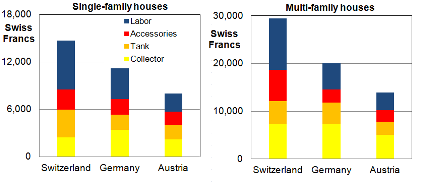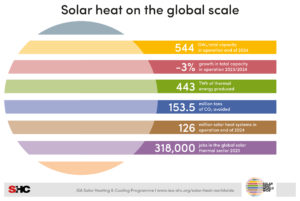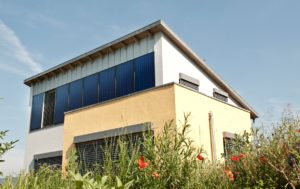Switzerland: Solar Thermal Systems Cost Almost Twice as Much as in Austria
December 20, 2014
 The Swiss Federal Office of Energy (SFOE) has just published a study on end customer prices for solar thermal systems in Switzerland. It turns out that, including installation, a typical Swiss solar thermal system configuration for a single-family home costs almost twice as much in Switzerland as they would in neighbouring Austria and about 30 % more than in southern Germany (see chart on the left). High labour costs and quality standards account for much of the price difference, but they cannot explain all of it. The study, which was carried out by Swiss company Ernst Basler + Partner, includes measures that can be taken to reduce prices on the market (see the attached document in German).
The Swiss Federal Office of Energy (SFOE) has just published a study on end customer prices for solar thermal systems in Switzerland. It turns out that, including installation, a typical Swiss solar thermal system configuration for a single-family home costs almost twice as much in Switzerland as they would in neighbouring Austria and about 30 % more than in southern Germany (see chart on the left). High labour costs and quality standards account for much of the price difference, but they cannot explain all of it. The study, which was carried out by Swiss company Ernst Basler + Partner, includes measures that can be taken to reduce prices on the market (see the attached document in German).Figure: Swiss Federal Office of Energy
The study compares the prices of solar thermal systems sold in Switzerland, Austria and the state of Baden-Württemberg, which is part of southern Germany. It is a well-known fact among experts that solar thermal systems in Switzerland are much more expensive than in the other two regions. Therefore, the authors of the study did not only compare prices but also analysed the reasons for the price differential.
In Switzerland, a typical domestic hot water system would have 5 m2 of collector area, 500 litres of storage volume and be a roof-integrated installation, which would cost Swiss France (SFR) 15,400 (EUR 12,800 or 2,560 EUR/m²). The same system is 27 % less expensive in Baden-Württemberg and 43 % cheaper in Austria (see chart above). In reality, solar thermal systems sold in Austria and Baden-Württemberg usually have smaller storage tanks and are mounted on the roof, which leads to even lower prices (44 % lower in the south of Germany, 49 % lower in Austria). Systems for multi-family houses show a similar price gap across the three regions.
“We pointed out the great price difference one and a half years ago, but Swiss companies said that we compared apples with oranges. Now, we can prove that even an apple-with-apple comparison shows prices to be a lot higher in Switzerland,” David Stickelberger, Managing Director of the Swiss solar industry association, Swissolar, says.
Switzerland’s high labour costs and quality requirements make solar thermal expensive
The high labour costs in Switzerland account for half of the price difference. They are the result of higher wages and higher workplace safety standards – in Switzerland, regulations about work are stricter controlled. Other factors for the high prices are the typical roof-integrated installations and the fact that only few solar systems are installed while a roof is redone – which means that the full costs for scaffolding are attributed to the solar installation. Usually, Swiss storage tanks are also larger and sometimes made of chrome steel, an expensive material. Heat losses have to be certified according to national standards, and before November 2014, systems had to meet other requirements for certification as well.
Additionally, Swiss customers are, for the most part, less price-sensitive, wholesalers in Switzerland calculate with higher gross margins than in Germany or Austria, and many of the Swiss installers set up solar thermal systems only from time to time, which means low rebates for materials and more time needed for the installation.
Study proposes measures to drive down solar thermal system prices
The authors of the study propose multi-level measures to reduce prices, so that solar thermal will become more competitive. They consider those measures most important which ensure a growing market if and when prices fall. One measure would be an obligation to use renewable energies whenever a heating system is replaced. The cantonal energy directors published a draft for such an obligation in May 2014; their decision is scheduled for 9 January 2015. As a second, similar measure, the authors suggest an incentive scheme for less expensive solar thermal systems, with subsidies to decrease gradually.
In addition to these two measures for stimulating the market, there are 19 other ones proposed in the document (see page 63-65 in the attached document). The most important are:
- Standardise systems: Manufacturers, wholesalers and installers should create a low-cost standard system and market it proactively. The authors compared system kits in Switzerland, Germany and Austria and found that the Swiss market only offers expensive system configurations.
- Reduce legal obstacles: This measure has already been implemented: The Swiss Gas and Water Industry Association (Schweizerische Verein des Gas- und Wasserfachs, SVGW) dropped the additional requirements for solar drinking-water tanks. Since November 2014, the only regulations in place have been the European standards for water quality and the Swiss standards for heat losses.
- Increase transparency: The SFOE or the solar industry association Swissolar could list guide prices. Consumer organisations at federal level could support consumers by publishing recommendations and product tests. Manufacturers and wholesalers could also sell solar thermal systems directly to end customers and organise the roof installation for them by engaging specialised installation teams and involve local plumbers for the hydraulic work in the basement.
- Grow the market: The cantons and the federal government could support large-scale solar thermal systems. Swissolar and the federal government could push forward the Masterplan Solarwärme, which was published in May 2013.
Stickelberger adds: “Prices for solar thermal systems in Switzerland have to go down. The example of photovoltaics shows how it works. A stable political framework made impressive cost cuts possible. But we don’t have much time left – we really need to push ahead now.”
More information:
Swiss Federal Office of Energy: http://www.bfe.admin.ch/
Swissolar: http://www.swissolar.ch
Ernst Basler + Partner: http://www.ebp.ch


